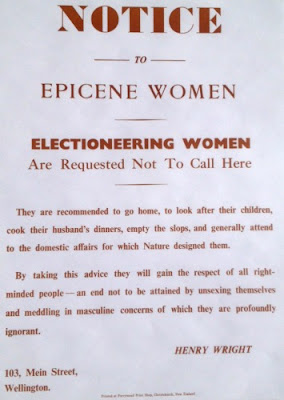 |
| NZ Anti-suffrage poster "Notice to Epicene Women"* (You can buy an authentic letterpress re-print here) |
The National Library has dated this poster's printing to November 1902 citing an extract from the New Zealand free lance 22 November 1902, page 6: "I wonder who "Henry Wright" is? He has issued a circular to "Epicene Women", who are interested in the elections, asking them not to call on him, but to stay at home and cook their husbands' dinners, and other things. Evidently a woman hater. Oh well, it is delightful to have such frank gentlemen living in Wellington. I am interested in the elections but I shall not call for "Henry Wright's" vote. There appears to be nothing epicene about him".
However an anonymous researcher has added a note to the bottom of the re-issued letterpress poster that the notice was first used to deter campaigners door knocking for a series of massive petitions that had gathered the signatures of nearly a quarter of the adult European female population of New Zealand by 1893. [The term "electioneering women" would not have referred to women standing for Parliament and door knocking for votes as women were barred from standing for Parliament in NZ until 1919.]
Both the earlier and later usage dates could be correct if Mr Wright (and others - there is no record of how the size of the original print run) continued to provoke people with his poster for some years after the passing of the Electoral Act into law. But the actual date of first printing is almost certainly around 1893 rather than the National Library's date of 1902, it seems unlikely that even the most hidebound reactionary would still be bearing a grudge of such lasting intensity about women being allowed to vote a decade after the Electoral Act was passed that they would commission such a poster for its first use as late as the 1902 election.
 |
| Henry Wright |
A well-known man is Henry Wright.
Though "stoney" [broke] blokes shun him as a blight.
His spats and his hat
Just suit him quite pat
While his dress but reflects
His fondness for "checks"
And its little he recks
That many a woe-worn bankrupt might
solemnly swear he's "The Wrong Mr Wright"
The Evening Post characterised Wright at the time of his death at the age of 92 in 1936 as "one of the city's best-known figures. He has been described as the most benevolent looking professional debt-collector in the world. He was usually dressed in a belltopper, frock coat, and check trousers, with brightly-coloured tie and an opal pin."
This unique piece of NZ reactionary political propaganda has recently been re-printed using the traditional letterpress method (with moveable type laid by hand) by the letterpress enthusiasts at the Ferrymead Print Studio, the home of a superb collection of vintage printing equipment kept in working order entirely by volunteers. For sale at just $9.95 in NZ Fine Prints' vintage poster collection.
Special thanks to the "Papers Past" digital repository of New Zealand newspaper archives for enabling this writer to research this article on the background of the man behind this old poster.
Special thanks to the "Papers Past" digital repository of New Zealand newspaper archives for enabling this writer to research this article on the background of the man behind this old poster.
*The full text of the poster reads:
Notice to Epicene Women
Electioneering Women are requested not to call here
They are recommended to go home, to look after their children,
cook their husband's dinners, empty the slops, and generally attend
to the domestic affairs for which Nature designed them.
By taking this advice they will gain the respect of all right-
minded people - an end not to be attained by unsexing themselves
and meddling in the masculine concerns of which they are profoundly ignorant.
Henry Wright 103 Mein Street, Wellington.